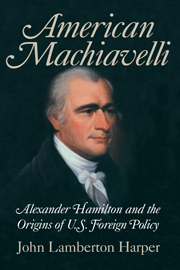Book contents
- Frontmatter
- Contents
- List of Illustrations
- Acknowledgments
- Miscellaneous Frontmatter
- Introduction
- PART I THE COMING OF NECESSITY
- 1 From Providence into Fortune, 1757 (?)–1781
- 2 Prepared To Be Not Good, 1781–1788
- PART II BATTLE LINES ARE DRAWN
- PART III SEIZING THE HELM
- PART IV INFORMAL ADVISER TO THE PRINCE
- PART V A PRINCE IN HIS OWN RIGHT?
- PART VI THE LESSER OF EVILS
- Conclusion: Hamilton Then and Now
- Notes
- Bibliography
- Index
1 - From Providence into Fortune, 1757 (?)–1781
Published online by Cambridge University Press: 05 April 2013
- Frontmatter
- Contents
- List of Illustrations
- Acknowledgments
- Miscellaneous Frontmatter
- Introduction
- PART I THE COMING OF NECESSITY
- 1 From Providence into Fortune, 1757 (?)–1781
- 2 Prepared To Be Not Good, 1781–1788
- PART II BATTLE LINES ARE DRAWN
- PART III SEIZING THE HELM
- PART IV INFORMAL ADVISER TO THE PRINCE
- PART V A PRINCE IN HIS OWN RIGHT?
- PART VI THE LESSER OF EVILS
- Conclusion: Hamilton Then and Now
- Notes
- Bibliography
- Index
Summary
Introduction
In September 1494, King Charles VIII of France invaded Italy with an army of 18,000 men and a horse-drawn siege train of at least forty pieces of artillery. Charles’s aim was to enforce his claim to the throne of the Kingdom of Naples by ousting its Aragonese holder. At the height of their artistic splendor but tragically divided, the Italian states became the objects of a struggle between France and Spain lasting more than thirty years. Unable to ensure the safety and dignity of Florence, the Medici family regime, which had ruled the city for sixty years, collapsed in November 1494. In its place, the Florentines refounded their republic. Its cumbersome institutions included the Great Council, newly enfranchising about 3,000 citizens (of a total of some 60,000), the Major Council, composed of about 1,000 citizens, ages twenty-nine or older, the Council of Eighty, limited to men over forty, the signoria, or rotating ten-man executive headed by a gonfaloniere, or standard-bearer, plus a number of specialized commissions.
In May 1498, twenty-nine-year-old Niccolò Machiavelli was appointed secretary and head of the Second Chancery, a bureau dealing with the city’s outlying dominions (they included most of the present-day Region of Tuscany, except for the provinces of Lucca, Siena, and Grosseto). He was also made secretary of “The Ten of Liberty and Peace,” a commission overseeing military and diplomatic affairs. On behalf of “The Ten,” Machiavelli would mount his horse innumerable times, gallop along the rough roads of Renaissance Europe, and parley with the mighty of his day. But despite his energy and brilliance, Machiavelli faced a built-in ceiling to his career. He sprang from a none-too-prosperous and (according to rumor) illegitimate branch of a distinguished family. His father, Bernardo, owed a debt of back taxes to the city government and thus Machiavelli was excluded from high political office. This was something that the city’s haughty patriciate (the so-called ottimati, who looked with suspicion on the republic’s policies) did not let him forget.
- Type
- Chapter
- Information
- American MachiavelliAlexander Hamilton and the Origins of U.S. Foreign Policy, pp. 11 - 25Publisher: Cambridge University PressPrint publication year: 2004



